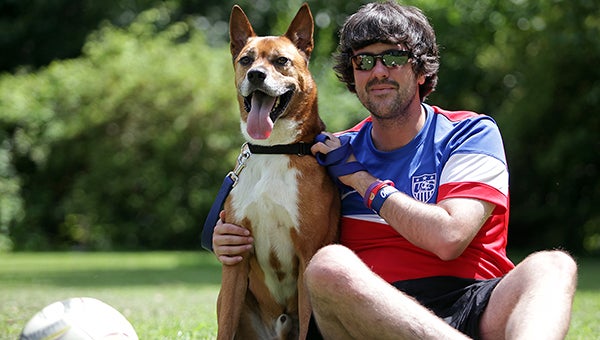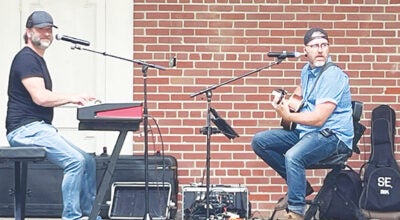New lease on life
Published 11:59 pm Saturday, July 5, 2014

Trey Banks sits outside his home in Bovina with his 4-year-old Norwegian Elkhound Beckham. Banks, the former Warren Central girls’ soccer coach who was stricken with Colitis and Crohn’s Disease in 2005, said this is the first time in nine years he’s been able to play with his dog or kick a soccer ball. (Justin Sellers/The Vicksburg Post)
Banks happy, healthy after battle with colitis
rey Banks has literally had his guts ripped out.
A long-running battle with the intestinal ailments Chron’s Disease and colitis have taken their toll. The one-time high school and college soccer player and former Warren Central coach has barely been able to run or kick a ball in nearly a decade, as a half-dozen operations left him virtually disemboweled. Two almost killed him.
At long last, however, things are looking up. A recent surgery is expected to be the last, and Banks landed a job as an assistant coach at soccer powerhouse Northwest Rankin in May. Armed with a perpetually upbeat attitude, he’s vowing to live life to the fullest as he embarks on the next chapter in his life.
“It’s the first time in nine years that I’m in remission,” Banks said at his home as he watched a World Cup game. “I have no colon, and they removed a foot of my small intestine that had Chron’s. I’ve never felt better.”
•
Banks’ battle with Chron’s and colitis started in 2005, when he was a 21-year-old student at Ole Miss.
It started with bouts of bloody diahrrea, which he tried to ignore or pass off as not serious. In short order, however, it took control of his life.
His body withered from a healthy 195 pounds to a scrawny 155. Weakened and afraid, he didn’t want to leave the house. He’d come home from class, head to his room and remain there until dragging himself out of bed the next morning.
“I was scared to do anything, because I was always scared of having to go to the bathroom,” Banks said. “That’s what the disease does. It eats you away.”
Emotionally, Banks became withdrawn. Physically, he was in even worse shape. In addition to the weight loss, he was losing blood without knowing it. So much of it was seeping out in his stool that he was slowly bleeding to death.
By the time a fraternity brother convinced him to go to the hospital in November 2005, Banks had less than four pints of blood in his body. The human body typically holds about 12 pints.
“They told me I should be legally dead,” Banks said.
Banks was diagnosed with ulcerative colitis. The disease causes long-lasting inflammation in the digestive track and can cause life-threatening complications like Banks had.
There is no cure for ulcerative colitis, but it can be treated. Banks did that for three years, taking medication that ballooned his weight up to 280 pounds at one point.
In 2008, he had a surgical procedure that removed a large portion of his colon and stretched the small intestine through his body to compensate. It appeared to be a success. Banks was able to return to his job as a teacher and assistant soccer coach at Warren Central that summer.
Deep inside of him, however, the disease was still lurking like a hand grenade. Banks was upbeat and optimistic, but a phone call one September morning would pull the pin and bring everything crashing down again.
•
Soccer is and always will be Banks’ passion.
On this day, a half-dozen United States Men’s National Team jerseys were splayed out on the kitchen table. On his back was a bright orange Netherlands jersey, in support of his “second favorite team,” which was playing a World Cup match that day.
Banks shifted gears abruptly from telling his story to rewind and watch a goal by the Dutch. The brief pause turned into minutes as he pulled out his phone to video it and post it on the social media site Vine.
Banks’ plan was to post video of every World Cup goal as he watched each of the 63 matches.
After posting that video, the smile as bright as his orange jersey disappears and the tale of his torturous decade continues.
“Then my dad died,” Banks said, picking up where he left off. “It was September 23, 2008. All I remember is, they pulled me out of class and said go home. Just go home.”
Banks raced the eight miles from Warren Central to the family’s home in Bovina. There, he learned that his father, Richard, had died that morning of a heart attack.
As he dealt with his grief, Trey soon felt an all-too-familiar pain in his gut. The colitis he thought he had conquered wasn’t gone after all.
“The stress caused the disease to come back,” he said.
As before, Banks tried to hide it. This time it wasn’t out of fear or shame — he’d become an outspoken advocate for colitis awareness after his first bout with the disease — but for professional reasons.
Banks was still coaching soccer, and didn’t want his players to see him weighted down.
“I fought it. I still coached soccer and never told the kids I was sick,” Banks said. “I’m one of the most positive people you’ll ever meet. The only people who knew I was sick were other coaches and principals.”
Banks dealt with the disease as best he could. Accommodations were made with other teachers to quietly cover classes in case he needed to make trips to the restroom. He continued to coach, as well, although the energy wasn’t always there to do so. He’d occasionally sit in a chair on the sideline and watch the action, as opposed to pacing it.
He rarely missed a game or a practice, though.
“I knew him on a personal level through our families, so I knew what he was going through,” said Katie Humphries, who played for Banks at Warren Central from 2010-13. “As far as the team, he kept it a secret. He did a good job of hiding it.
“He gave the team 100 percent,” Humphries continued. “I’ve played soccer since I was little, and never had a coach that had so much heart and love for one team. I think being with us made it better.”
Physically, though, Banks was not better.
The colitis was slowly destroying what little remained of his colon. In 2010, he opted to have more of his intestine removed and to get a colostomy bag — a disposable pouch on the outside of his body. His waste flows through an opening in his abdomen and into the bag.
Although not an appealing option, Banks said it was the best one available and a necessary tradeoff.
“I’m blessed to be alive,” he said. “I’m able to do things that I want to do. I can live with that.”
Getting the surgery allowed Banks to live a normal life, and also to fulfill his goal of becoming a head coach. He was hired as Warren Central’s girls coach in 2010.
Banks threw himself into his work, spending nearly every waking moment dissecting the team, opponents and game plans. He went 33-25-6 over the next three seasons before leaving to become the boys head coach at Center Hill High School in Desoto County in June 2013.
When he wasn’t coaching Warren Central, he was working with youth teams in the Vicksburg Soccer Organization and its Cannon program.
“He handled it so well. He was so enthusiastic about the game plans and getting us pumped up. After the last game we went in there and cried with him,” said Humphries, who was WC’s team captain in the 2012-13 season and is now a student at Mississippi State. “It was tough to see, but I knew he loved what he’s doing. So it’s a give and take. It’s just amazing how he dealt with it all.”
When Banks left Warren Central, he jumped into his new job at Center Hill with the same level of enthusiasm he showed for his old one.
An avid user of social media, he let word leak of his move with cryptic Facebook messages showing the slogan “Respect the Hill” and pictures of himself in Center Hill shirts.
Once again, things seemed to be on the upswing for Banks.
And, once again, his old foe colitis was having none of it. Only this time, it was bringing a friend.
“The last year of my life has been the hardest,” Banks said quietly.
•
On the big screen TV in Banks’ living room, the Netherlands is turning its game against Spain into a rout. The Dutch score four goals in the second half en route to a 5-1 win. Each goal brings a sudden halt to the conversation as Banks catches it out of the corner of his eye.
“Wait. Did they score again?” Banks excitedly asks his friend and former assistant coach Michael Cooper, who has come over to watch the game.
“Hold on,” Banks adds as he pulls out the phone and the remote to video and post the goal.
The Netherlands’ scoring flurry sends Banks’ story into a fit of starts and stops, which is appropriate for the third act.
Throughout the summer of 2013, Banks eagerly geared up for his first season as Center Hill’s coach. June and July were filled with 7-on-7 games, camps and fundraisers. He even stood in goal one night to take practice shots against his new players. His final save was a diving punchaway of the ball that showed athleticism he hadn’t been able to achieve in years.
By a quirk, Center Hill’s first game of the 2013-14 season was up the street from Banks’ home in Bovina — and against Warren Central. The previous coach had scheduled it well before Banks was hired, but from the moment he got the job it was one Banks looked forward to.
He never got to coach it.
In late July, a checkup revealed that the tiny bit of Banks’ rectum — the lowest part of his colon — that remained was nearly cancerous.
“The rectum that was left was turning black. It was turning useless,” Banks said.
A few weeks later he stepped down from his coaching job at Center Hill. He continued to teach at the school, but through the fall his health deteriorated again. Despite not having an appetite, he was gaining weight and looking pale.
“I couldn’t even eat Thanksgiving dinner,” he said. “I went to work two days the next week and then went home.”
A CT scan the next week found softball-sized abcesses on his stomach, caused by the colitis. He’d also developed Chron’s Disease, another inflammatory bowel disease. Unlike colitis, which only affects the colon, Chron’s affects the entire gastrointestinal tract.
He had an operation in early December, and was feeling well enough by Christmas to travel to Chicago to visit his sister. For a Christmas and birthday present — Banks turned 30 on Dec. 30 — she’d gotten him tickets on the 50-yard line to the Bears-Packers game at Soldier Field on Dec. 29.
Banks couldn’t go.
His gut began aching again on Christmas Eve, and a trip to the hospital revealed two more abcesses on his stomach.
“I spent Christmas in a random hospital in Chicago,” he said with a mix of annoyance and bemusement.
He returned to Mississippi on New Year’s Eve, but the new year didn’t bring any relief to his health issues. On Jan. 17 he had 400 cubic centimeters of pus drained from his body. Ten days later, a drainage tube was inserted that required regular maintenance. Two weeks after that, he resigned from his teaching job at Center Hill and moved back to Bovina.
Finally, another surgery was scheduled for March 5 at Vanderbilt Medical Center in Nashville. The six-hour procedure moved his colostomy bag from the right side of his body to the left to make it easier to process waste. Most importantly, the last 2 inches of his infected rectum were removed.
When the disease was literally cut out of his body, Banks immediately began to feel better.
“That night after surgery I was up and walking,” he said. “The next day I did 15 laps around the hospital. The day after that it was 30 laps. I was only in the hospital four days.”
•
In Brazil, the Dutch were already putting a huge victory in the rearview and looking ahead to the next challenge.
Thousands of miles away in Bovina, Banks does the same with his story and a decade of health issues.
Other than for regular checkups and treatment, he hasn’t been back to the hospital since his last surgery. The smile and enthusiasm that never faded even during his darkest days have brightened even more.
He’s even returned to coaching, both with the Cannon program and in the high school ranks. Northwest Rankin coach Montgomery Hinton hired Banks as an assistant coach in May and said his battle with Chron’s and colitis was an inspiration.
“We all remember the Gipper stories, but when you have one that’s alive and well in front of you, that’s a whole different thing,” Hinton said.
Hinton wasn’t the only one amazed at Banks’ perpetually perky persona. Cooper, who was Banks’ assistant at WC for the 2012-13 season, said an already healthy respect grew as he watched his friend remain positive through his ailments.
“I’ve always had a lot of respect for him, but watching him fight through it just gave me even more,” Cooper said. “It just shows that no matter what’s going on in anybody’s life, you can keep a positive attitude and not let it control you.”
Cooper’s sentiment is one Banks quickly seizes on, and said is the message he wants to send out to the world.
“I want people to realize that you can’t let an illness keep you from being you. That only brings about depression. You can’t live an exciting life that way,” Banks said. “I just want people to know I went through something horrible. I didn’t let some disease keep me from what I wanted to do.”
Exactly what he went through is also a story Banks is eager to tell. He was barely old enough to drink a beer when his battle with inflammatory bowel diseases began, and by the time he was 30 his life had changed forever.
He’s intimately familiar with the fear and shame young people with IBDs can feel, and wants to spread the message that they don’t need to be.
“There’s people who have it that neglect it. They don’t understand that once you get to age 25 you need a colonoscopy every year,” Banks said. “Don’t be ashamed or scared if you notice something in your stool. Go to your doctor. Go to a specialist.”
And, most importantly, Banks adds, don’t let it keep you from being you.
“I hope somebody with IBD who is sick can see I still was myself. I didn’t let it hold me back. If I could only play soccer for five minutes, I would play for five minutes,” he said. “I want them to say, ‘If he can get through it, I can get through it.’”
The postgame wrapup begins for the Netherlands game. Cooper leaves, and Banks begins calling other friends to see if they want to watch the next game with him.
There’s always another game, and Banks has issued an open invitation for people to watch it with him. His long contact list is the product of a life well-lived despite the hardships, of an infectious and positive attitude that’s hard to turn down.
“You’ve got two choices in life — put your head to the ground and press on, or whine and bellyache,” Hinton said. “It’s easy to see which one he picked.”






